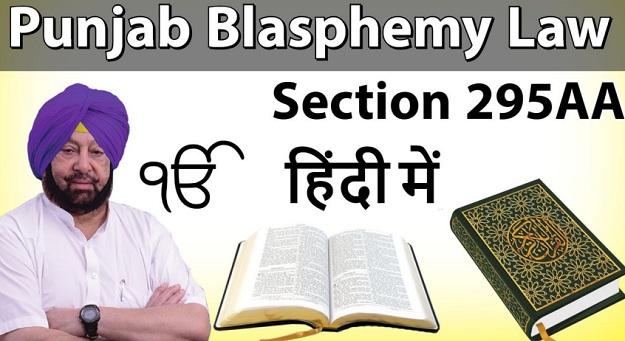Table of Contents
WHAT JUST HAPPENED?
•The Punjab government recently decided to expand the scope of India’s desecration law.
•It proposed to add Section 295AA to the Indian Penal Code to make “injury, damage or sacrilege to Sri Guru Granth Sahib, Srimad Bhagwad Geeta, Holy Quran and Holy Bible with the intention to hurt the religious feelings of the people” a crime punishable with life imprisonment. REASON? Justice Ranjit Singh Commission Set up in April 2017 to look into incidents of the desecration of the Guru Granth Sahib, the holy text of the Sikhs, over the previous two years as well as the police firing on villagers protesting one such incident in October 2015. The firing at Kotkapura and Behbal Kalan had left two people dead and several injured.
NOTES
• Section 295 AA is no more than duplication of an existing provision on desecration that gives the state sweeping powers to make arrests.
•The Punjab government’s proposal to amend Article 295 of the Penal Code is deeply regressive and will have deep ramifications beyond Punjab
BLASPHEMY
The action or offence of speaking sacrilegiously about God or sacred things; profane talk.

LEARNINGS FROM PAKISTAN
The progressive strengthening of anti-blasphemy laws in Pakistan during the Seventies was a sign of a toxic combination of greater intolerance and authoritarianism The Constitution underlines the secular democratic character of Indian polity by not only invoking it in the Preamble but also by guaranteeing the right to religious freedom through Articles 19 and 25. Given this, there are existing laws to punish those who hurts religious sentiments — so, is there a need to bring an extraordinary law?
NOTES
What should a liberal state strive for? A liberal state needs two sensibilities The first is that many good things are good and derive their authentic meaning precisely from the fact that there is no coercion behind them The second is that personal beliefs and faith, even if entirely sound, do not by themselves provide sufficient ground for the state using its coercive power to enforce them
POPULIST LAWS ARE TEARING APART SECULAR FABRIC
In India, we are constantly expanding the circle of deference to the religious sentiment Making religious sentiments the basis for law is a recipe for competitive political mobilisation and conflict, not of peace The law is sectarian as it protects four texts and the state has decided which texts get protection If the desecrators have a political purpose, it is to make sure that they can use religious sentiments to destroy India’s liberal democracy Religious sentiments need not be illiberal, but they become illiberal when they become the basis for the state enforcing the idea that everyone has to defer to those sentiments






















 WhatsApp
WhatsApp